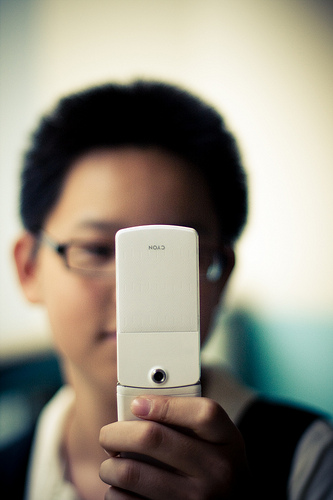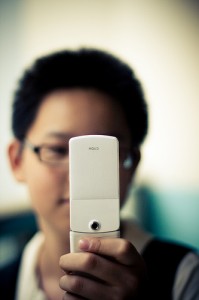Student sues over confiscated cell phone

When N.N. was a senior at Tunkhannock High School in Pennsylvania, her principal took her cell phone and searched it. He found nude pictures that N.N. had taken of herself and turned them over to the local prosecutor. [As a minor and due to the nature of the case, her full name has been kept confidential].

Photo by DQT (Flickr)
“Those pictures were extremely private and not meant for anyone else’s eyes. What they did is the equivalent of spying on me through my bedroom window.” To avoid child pornography charges, she was required to take a five-week class on sexual violence and victimization. She was also suspended for three days.
In May, 2010, N.N., now 19, filed a lawsuit against the principal, school district, prosecutor and a detective. She seeks unspecified damages and destruction of all images in the possession of law-enforcement officials. She alleges an illegal search of her phone since there was no probable cause to suspect that she had violated a law or school rule. She further alleges that her right to free speech was violated in being disciplined for images in her possession and that she had taken.
A similar lawsuit was filed in Mississippi by a middle school student in 2009. Richard Wade was 12 when he looked at a text he received from his father during PE. The coach confiscated his phone and a search uncovered what the school interpreted as gang signs. Richard was expelled although explaining that he was simply dancing in his bedroom with a friend. Richard sued also claiming an illegal search of his cell phone and infringement of his free speech.
This is a new area of the law that remains to be decided by our nation’s courts. The Fourth Amendment guarantees all Americans protection against unreasonable searches and seizures. Applied to new technologies including cell phones, Blackberries, computers and the like will likely be in the courts for many years.
Does your state have a sexting law? Do you know what the penalties are and if they apply to you? Should there be a difference between possession of the cell phone with the photos and the receiver of a sext message? Do you think child pornography laws should include sexting? What about being required to register as a sex offender if convicted of sexting – is that necessary or going overboard? Do you have any privacy on your cell phone as N.N. thought she had?
Find out more about student rights concerning cell phone use in school.
Update: N.N. and the Pennsylvania school district settled the case in September 2010. The school district admitted no wrongdoing, but agreed to pay N.N. $33,000. In a related lawsuit against the District Attorney’s Office, the case is still pending and has yet to be settled. The Pennsylvania School Board is working on guidelines to help deal with situations involving cell phones when they come up at the schools.
On November 1, 2010, a federal court dismissed Richard Wade’s lawsuit against the police officer involved and the City of Southhaven, Mississippi. The court found no constitutional violations by the officer in searching Richard’s cell phone. The suit continues against the school district.



Can a principal keep a phone after a parent has said the student can have it?
Dear Jess: It depends on the rules at the school where this happened. Take a look at the Student Handbook for the school rules about digital devices, including cell phones, at school. You can get a copy in the front office or on the school’s website. If you have further questions, ask a school official. Generally, schools are authorized to impose discipline for violating these rules, including keeping the device for a period of time.
(This is information only – not legal advice).
can a school legally take your phone when it is dead and not in use and without reason
Dear Brady: For the rules about digital devices at school, take a look at your Student Handbook. Schools do need what’s called “reasonable suspicion” to take action against a student including confiscating a cell phone, tablet, etc. If you have questions about an incident, talk with your parents first. They may want to schedule a meeting with the principal or vice-principal to discuss what happened. Good luck.
(This is information only – not legal advice).
In the case of N.N. she asserted that the images were not meant for anyone else which means she was not sexting. Sometimes a nude picture isn’t meant to be pornographic. For example, she may have been taking breast growth measurements. Just because the authorities viewing it sexualized her doesn’t mean she sexualized herself and that’s something I wish they could get their heads around. More importantly, the authorities violated her by making copies of her nude pictures and I find it very disturbing that there are apparently no laws preventing them from keeping and viewing nude pictures of children.
Why does she even need a lawsuit to make them give them up? That reminds me of an early internet obscenity case where authorities actually sent child pornography to the people they were investigating. That part of the charges were dropped, but why were they able to send it to begin with? What laws are in place to protect children from authorities spreading their pictures?
As far as the sexting issue as a whole, I agree it’s a problem, but is prosecution really the solution? And how can that even legally work?
If an adult is found to be legally incompetent a crime is not committed. (For example, men with sexomnia acquitted of rape) With children the presumption is that they need to be protected because they are legally incompetent. The only reason why child pornography laws exist is that, unlike adults, they are assumed to not be capable of making a choice. If they are not legally capable of consenting how are they legally capable of be held responsible for consenting? And this is all the more serious in cases where children were arrested for having been sent a nude image even if they didn’t want it. How can a child, who is not legally capable of consenting to any of this, held responsible for what they don’t even know?
What about societal impact? With the sex offender registry the point is to protect the general public, but how is anyone protected from requiring a child to tell their neighbors that she takes nude pictures of herself? Even if they are kept off the registry until they turn 18 (as happens in some states) how does that do any good? When they turn 18 they can legally consent to pornography so what exactly is gained from this? Especially when we consider that a girl on the registry might just be listed as “Child Pornography” without explanation so a viewer might think that she victimized someone else which would directly harm her ability to get any work EXCEPT for pornography. She would never get to go to good schools and can never get a good job. If she has children of her own she can never approach the school grounds or participate in PTA meetings. She will be forever barred from that. How is that right? In effect the end result of this approach is to harm children and push them in a direction that we should be protecting them from.
To be completely honest, there are so many people that go onto the registry for nonsense like this that, for me, the registry has lost all meaning. I can’t trust it anymore, and if I can’t trust it what good is it?
Dear Elliander: You raise some valid points. Many states have recognized the need to treat sexting as a matter of educating our youth rather than criminalizing their behavior. Thanks for writing us. -ATJ.info